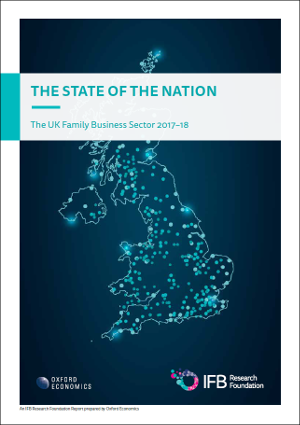Ungated Post | 03 Apr 2018
The State of The Nation: The UK Family Business Sector 2017-18

Family-run businesses are vital to the United Kingdom economy, accounting for 88 percent of all UK firms. They operate in every industrial sector throughout each nation and region, employing almost half of the UK’s private-sector workforce.
In this report for the IFB Research Foundation, Oxford Economics presents the most up-to-date evidence on the family business sector, detailing its key characteristics, recent performances and economic contributions to the UK as a whole. Looking forward, it sheds light on the unique challenges the sector faces, and its plans for future growth.
Family businesses employ more than 12.2 million people in 4.8 million UK firms. Their output contributes £519 million to the UK’s annual GDP––more than a quarter of all the country’s economic activity each year. The sector also generates some £149 million in taxes for HM Treasury––larger than the NHS’s budget for 2016/17.
The UK’s family businesses have ambitious plans: this report finds that 60 per cent intend to increase the skills of their workforce over the next three years to achieve further growth, while more than a third say they plan to inject capital investment or introduce new working practices. Not that it’s all plain sailing, of course: the report also identifies increased competition and regulations as family businesses’ two main obstacles to success.
Oxford Economics’ team is expert at applying advanced economic tools that provide valuable insights into today’s most pressing business, financial, and policy issues.
To find out more about our capabilities, contact:
Americas
Diantha Redd
+1 (646) 503 3052
Email
Asia Pacific
Peter Suomi
+65 6850 0110
Email
EMEA
Aoife Pearson
+44 (0)203 910 8054
Email
Related Services

Post
The economic impact of abandoning the WTO
Oxford Economics have been commissioned by the International Chamber of Commerce (ICC) to provide an independent assessment of the economic impact of WTO dissolution. This report details our findings and the assumptions underpinning our analysis.
Find Out More
Post
The economic impact of the sports activities of public service media
This study shows how the sports activities of public service media supported €4.5 billion of GDP and 57,000 jobs across 31 European countries in 2022, taking direct, indirect (supply chain), and induced (wage-funded expenditure) impacts into account. The report also highlights wider economic benefits of public service media sports coverage, such as the way in which it leverages sponsorship income for sports bodies.
Find Out More
Post
Global Trade Education: The role of private philanthropy
Global trade can amplify economic development and poverty alleviation. Capable leaders are required to put in place enabling conditions for trade, but currently these skills are underprovided in developing countries. For philanthropists, investing in trade leadership talent through graduate-level scholarships is an opportunity to make meaningful contributions that can multiply and sustain global economic development.
Find Out More